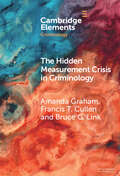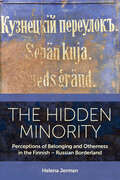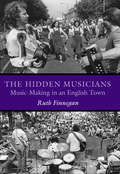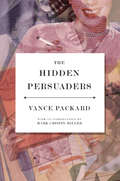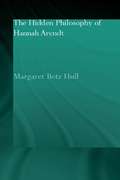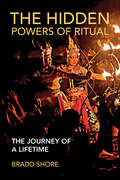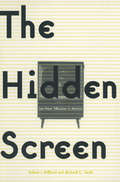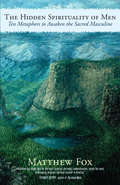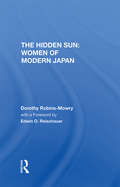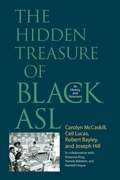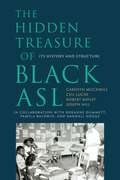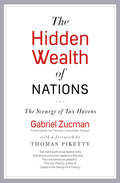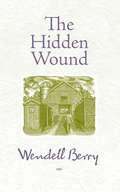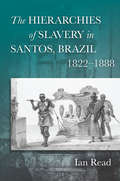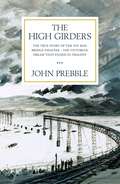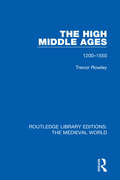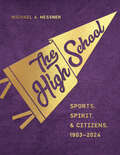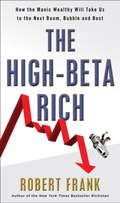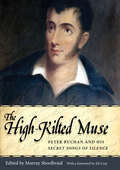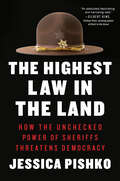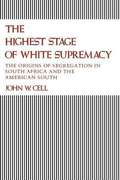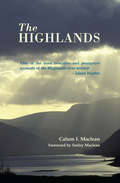- Table View
- List View
The Hidden Measurement Crisis in Criminology: Procedural Justice as a Case Study (Elements in Criminology)
by Francis T. Cullen Amanda Graham Bruce G. LinkThe field of criminology is limited by a 'hidden' measurement crisis. It is hidden because scholars either are not aware of the shortcomings of their measures or have implicitly agreed that scales with certain properties merit publication. It is a crisis because the approaches used to construct measures do not employ modern systematic psychometric methods. As a result, the degree to which existing measures have methodological limitations is unknown. The purpose of this Element is to unmask this hidden crisis and provide a case study demonstrating how to build a measure of a prominent criminological construct through modern systematic psychometric methods. Using multiple surveys and item response theory, it develops a ten-item scale of procedural justice in policing. This can be used in primary research and to adjudicate existing measures. The goal is to reveal the nature of the field's measurement crisis and show a strategy for solving it.
The Hidden Minority: Perceptions of Belonging and Otherness in the Finnish – Russian Borderland (EASA Series #52)
by Helena JermanLooking at the Finnish–Russian borderland as a transnational space and claiming that there is a need to understand the long-term effects of migration – a continuing process spanning several generations – The Hidden Minority takes a multi-temporal perspective on mobility and belonging. The focus of this ethnographic study is the Russian minority in Finland, which is socially, economically, politically and culturally heterogeneous.The Russian minority in Finland is imbued with ’being hidden‘ or ’hiding oneself‘. The book explores informants’ reflections, together with the author, on the mental and physical crossing of national borders. Perceptions of belonging and/or Otherness and lived experience reveal a complex relationship of embodied memory, history, time and a multi-national social space.
The Hidden Musicians: Music-Making in an English Town (Music Culture)
by Ruth FinneganA landmark in the study of music and culture, this acclaimed volume documents the remarkable scope of amateur music-making in the English town of Milton Keynes. It presents in vivid detail the contrasting yet overlapping worlds of classical orchestras, church choirs, brass bands, amateur operatic societies, and amateur bands playing jazz, rock, folk, and country. Notable for its contribution to wider theoretical debates and its influential challenge to long-held assumptions about music and how to study it, the book focuses on the practices rather than the texts or theory of music, rejecting the idea that only selected musical traditions, "great names," or professional musicians are worth studying. This opens the door to the invisible work put in by thousands of local people of diverse backgrounds, and how the pathways creatively trodden by amateur musicians have something to tell us about both urban living and what it is to be human. Now with a new preface by the author, this long-awaited reissue of The Hidden Musicians will bring its insights and innovations to a new generation of students and scholars.
The Hidden Persuaders
by Mark Crispin Miller Vance Packard"One of the best books around for demystifying the deliberately mysterious arts of advertising."--Salon"Fascinating, entertaining and thought-stimulating."--The New York Times Book Review"A brisk, authoritative and frightening report on how manufacturers, fundraisers and politicians are attempting to turn the American mind into a kind of catatonic dough that will buy, give or vote at their command--The New YorkerOriginally published in 1957 and now back in print to celebrate its fiftieth anniversary, The Hidden Persuaders is Vance Packard's pioneering and prescient work revealing how advertisers use psychological methods to tap into our unconscious desires in order to "persuade" us to buy the products they are selling.A classic examination of how our thoughts and feelings are manipulated by business, media and politicians, The Hidden Persuaders was the first book to expose the hidden world of "motivation research," the psychological technique that advertisers use to probe our minds in order to control our actions as consumers. Through analysis of products, political campaigns and television programs of the 1950s, Packard shows how the insidious manipulation practices that have come to dominate today's corporate-driven world began. Featuring an introduction by Mark Crispin Miller, The Hidden Persuaders has sold over one million copies, and forever changed the way we look at the world of advertising.Vance Packard (1914-1996) was an American journalist, social critic, and best-selling author. Among his other books were The Status Seekers, which described American social stratification and behavior, The Waste Makers, which criticizes planned obsolescence, and The Naked Society, about the threats to privacy posed by new technologies.
The Hidden Philosophy of Hannah Arendt (Routledge Jewish Studies Series)
by Margaret Betz HullThe central argument of this book is that Hannah Arendt's deserved place in the history of Western philosophy has been overlooked, and recognition of her contribution is long overdue. In part a result of Arendt's own insistence on calling herself a 'political thinker' throughout her career, this is also due to a common tendency in philosophy to denigrate the political. This book explores the indisputable philosophical dimensions of her work. In particular, it examines Arendt's theoretical commitment to recognizing humanity as a plurality, which avoids the common mistake in Western philosophy of theoretically overemphasizing the self in isolation. Arendt's own personal dealings with aspects of her identity, namely her Jewishness and her womanhood, work to inform us of this position against solipsism.
The Hidden Powers of Ritual: The Journey of a Lifetime
by Bradd ShoreAn illuminating overview of the development, benefits, and importance of ritual in everyday life, written by a leading cognitive anthropologist.The Hidden Powers of Ritual is an engaging introduction to ritual studies that presents ritual as an evolved form of human behavior of almost unimaginable significance to our species. Every day across the globe, people gather to share meals, brew caffeinated beverages, or honor their ancestors. In this book, Bradd Shore, a respected anthropologist, reaches beyond familiar &“big-R&” rituals to present life&’s humbler, overshadowed moments, exploring everything from the Balinese pelebon to baseball to family Zoom sessions in the age of Covid to the sobering reenactment rituals surrounding the Moore&’s Ford lynchings. In each ritual, Shore shows how our capacity to ritualize behavior is a remarkable part of the human story.Encompassing both the commonly unlabeled &“interaction rituals&” studied by sociologists and the symbolically elaborated sacred rituals of religious studies, Shore organizes his conception around detailed case studies drawn from international research and personal experience, weaving scholarship with a memoir of a life encompassed by ritual. A probing exploration that matches breadth with accessibility, The Hidden Powers of Ritual is a provocative contribution to ritual theory that will appeal to a wide range of readers curious about why these unique repetitive acts matter in our lives.
The Hidden Screen: Low Power Television in America
by Michael C. Keith Robert L. HilliardThis text explores the industry of low-power television (LPTV) in America. It covers what LPTV is and how it got started, who the broadcasters are and their viewers, LPTV's significance in contemporary society and culture, and the challenges it faces in the late 1990s and the millennium.
The Hidden Spirituality of Men: Ten Metaphors to Awaken the Sacred Masculine
by Matthew FoxIt is no secret that men are in trouble today. From war to ecological collapse, most of the world’s critical problems stem from a distorted masculinity out of control. Yet our culture rewards the very dysfunctions responsible for those problems. To Matthew Fox, our crucial task is to open our minds to a deeper understanding of the healthy masculine than we receive from our media, culture, and religions. Popular religion forces the punitive imagery of fundamentalism on us, pushing most men away from their natural yearning for spirituality and toward intolerance and domination. Meanwhile, many men, particularly young men, are looking for images of healthy masculinity to emulate and finding nothing. To awaken what Fox calls “the sacred masculine,” he unearths ten metaphors, or archetypes, ranging from the Green Man, an ancient pagan symbol of our fundamental relationship with nature, to the Grandfatherly Heart to the Spiritual Warrior. He explores archetypes of sacred marriage, showing how partnership becomes the ultimate expression of healthy masculinity. By stirring our natural yearning for healthy spirituality, Fox argues, these timeless archetypes can inspire men to pursue their higher calling to reinvent the world.
The Hidden Sun: Women Of Modern Japan
by Dorothy Robins-mowryEver since Japan and the West discovered one another, Western observers have extolled the surface virtues of Japanese women but attended very little to what they are really like. In this new, balanced view of the role of Japanese women in their country's swiftly changing society, Dr. Robins-Mowry destroys the Western stereotype of the shy, perhaps
The Hidden Treasure Of Black ASL: Its History And Structure
by Ceil Lucas Robert Bayley Joseph Hill Carolyn McCaskill Pamela Baldwin Roxanne Dummet-King Randall HoguePeople who first encounter sign language often ask if deaf people around the world sign the same language. Frequently, they are surprised to learn that there are different sign languages in different nations worldwide, as well as variations of these languages. These variations depend on social factors such as region, age, gender, socioeconomic status, and race. One variation, Black ASL, has been recognized for years as a distinct form of sign language but only through anecdotal reports. This volume and its accompanying DVD present the first empirical study that begins to fill in the linguistic gaps about Black ASL. The powerful cast of contributors to The Hidden Treasure of Black ASL considered three questions in their study. First, what was the sociohistorical reality that made a separate variety of ASL possible? Second, what are the features of the variety of ASL that people call Black ASL? Third, can the same kind of unique features that have been identified in African American English be identified in Black ASL? This groundbreaking book and its companion DVD go far in answering these questions while also showing the true treasures of Black ASL.
The Hidden Treasure of Black ASL: Its History and Structure
by Ceil Lucas Robert Bayley Joseph Christopher Hill Carolyn McCaskillBlack ASL has long been recognized as a distinct variety of American Sign Language based on abundant anecdotal evidence. The Hidden Treasure of Black ASL, originally published in 2011, presents the first sociohistorical and linguistic study of this language variety. Based on the findings of the Black ASL Project, which undertook this unprecedented research, Hidden Treasure documents the stories and language of the African American Deaf community. With links to online supplemental video content that includes interviews with Black ASL users (formerly on DVD), this volume is a groundbreaking scholarly contribution and a powerful affirmation for Black Deaf people. This paperback edition includes an updated foreword by Glenn B. Anderson, a new preface that reflects on the impact of this research, and an expanded list of references and resources on Black ASL. The supplemental video content is available online at the Gallaudet University Press YouTube Channel. Under Playlists, click “The Hidden Treasure of Black ASL: Companion Video to the Book.” As featured in the film Signing Black in America: The Story of Black ASL, produced by The Language and Life Project at North Carolina State University (Dr. Walt Wolfram, Executive Producer). Look for it on PBS.
The Hidden Wealth of Nations: The Scourge of Tax Havens
by Gabriel ZucmanA &“masterful&” work that quantifies the cost of tax havens and large-scale tax evasion to ordinary citizens, and explores solutions to the problem (American Prospect). One much-discussed solution to the rapidly growing problem of economic inequality is to significantly increase the rate at which we tax the wealthy. But with an enormous amount of the world&’s wealth hidden in tax havens—in countries like Switzerland, Luxembourg, and the Cayman Islands—this wealth cannot be fully accounted for and taxed fairly. No one, from economists to bankers to politicians, has been able to quantify exactly how much of the world&’s assets are currently hidden—until now. Gabriel Zucman is the first economist to offer reliable insight into the actual extent of the world&’s money held in tax havens. And it&’s staggering. Fighting the notion that any attempts to vanquish tax havens are futile since some countries will always offer more advantageous tax rates than others, as well the counter-argument that tax havens have disappeared since the 2007–2008 global financial crisis, Zucman shows how both sides are actually very wrong. In The Hidden Wealth of Nations he offers an ambitious agenda for reform, focused on ways in which countries can change the incentives of tax havens. Only by first understanding the enormity of the secret wealth can we begin to estimate the kind of actions that would force tax havens to give up their practices. Zucman&’s work has quickly become the gold standard for quantifying the amount of the world&’s assets held in havens. In this concise book, he lays out in approachable language how the international banking system works and the dangerous extent to which the large-scale evasion of taxes is undermining the global market as a whole. If we are to find a way to solve the problem of increasing inequality, The Hidden Wealth of Nations is essential reading. &“Unusually lucid and elegant prose—particularly for an economist—complemented by an admirable grasp of history. His review of the ways that efforts to combat tax evasion have stalled for the past century makes the book a worthwhile read in and of itself. . . . Zucman is still at the beginning of what promises to be a brilliant career.&” ―The Atlantic
The Hidden Wound
by Wendell BerryWith the expected grace of Wendell Berry comes The Hidden Wound, an essay about racism and the damage it has done to the identity of our country. Through Berry's personal experience, he explains how remaining passive in the face of the struggle of racism further corrodes America's potential. In a quiet and observant manner, Berry opens up about how his attempt to discuss racism is rooted in the hope that someday the historical wound will begin to heal.
The Hierarchies of Slavery in Santos, Brazil, 1822-1888
by Ian ReadDespite the inherent brutality of slavery, some slaves could find small but important opportunities to act decisively. The Hierarchies of Slavery in Santos, Brazil, 1822-1888explores such moments of opportunity and resistance in Santos, a Southeastern township in Imperial Brazil. It argues that slavery in Brazil was hierarchical: slaves' fleeting chances to form families, work jobs that would not kill or maim, avoid debilitating diseases, or find a (legal or illegal) pathway out of slavery were highly influenced by their demographic background and their owners' social position. By tracing the lives of slaves and owners through multiple records, the author is able to show that the cruelties that slaves faced were not equally shared. One important implication is that internal stratification likely helped perpetuate slavery because there was the belief, however illusionary, that escaping captivity was not necessary for social mobility.
The High Girders: The gripping true story of a Victorian dream that ended in tragedy
by John Prebble'A tale of irresponsibility and inexperience' THE TIMES'Graphically written with a sense of dramatic construction' SCOTSMANOn December 28th 1879, the night of the Great Storm, the Tay Bridge collapsed, along with the train that was crossing, and everyone on board...This is the true story of that disastrous night, told from multiple viewpoints:The station master waiting for the train to arrive - who sees the approaching lights simply vanish.The bored young boys watching from their bedroom window who witness the disaster.The dreamer who designed the bridge which eventually destroyed him.The old highlanders who professed the bridge doomed from the outset.The young woman on the ill-fated train, carrying a love letter from the man she hoped to marry...THE HIGH GIRDERS is a vivid, dramatic reconstruction of the ill-omened man-made catastrophe of the Tay Bridge disaster - and its grim aftermath.
The High Girders: The gripping true story of a Victorian dream that ended in tragedy
by John Prebble'A tale of irresponsibility and inexperience' THE TIMES'Graphically written with a sense of dramatic construction' SCOTSMANOn December 28th 1879, the night of the Great Storm, the Tay Bridge collapsed, along with the train that was crossing, and everyone on board...This is the true story of that disastrous night, told from multiple viewpoints:The station master waiting for the train to arrive - who sees the approaching lights simply vanish.The bored young boys watching from their bedroom window who witness the disaster.The dreamer who designed the bridge which eventually destroyed him.The old highlanders who professed the bridge doomed from the outset.The young woman on the ill-fated train, carrying a love letter from the man she hoped to marry...THE HIGH GIRDERS is a vivid, dramatic reconstruction of the ill-omened man-made catastrophe of the Tay Bridge disaster - and its grim aftermath.
The High Middle Ages: 1200-1550 (Routledge Library Editions: The Medieval World #43)
by Trevor RowleyOriginally published in 1986, The High Middle Ages begins in the late twelfth century and ends, not with the arrival of the Tudor monarchs in 1485, but with the destruction of the wealth and power of the Church in the 1530s. The book looks at how the passing of the monasteries marked the transition from an economic and social system based on a balance – however shifting and uneasy – between the church and state, to a supreme reign of the church. The book discusses how the later middle ages were a period not of decay but of rapid change. It examines how social and economic convulsion emerged in a society marked by restless energy and creativity. The three centuries covered in the book mark a key period of extensive change to the landscape and environment of England between 1200 to 1550.
The High School: Sports, Spirit, and Citizens, 1903-2024 (Critical Issues in Sport and Society)
by Michael A. MessnerHigh school yearbooks provide both a vivid snapshot of student life and a reflection of what the adults in the community valued the most. For instance, athletics are often covered more than academics, and boys’ sports routinely receive more attention than girls’ sports. But how have those values changed over time? In The High School, acclaimed sociologist Michael A. Messner reads through 120 years of El Gabilan, the yearbook from his own alma mater, Salinas High School in California, where his father taught and coached. Treating the yearbooks as a historical archive, Messner makes surprising discoveries about the school he thought he knew so well. For example, over fifty years before Title IX, the earliest yearbooks gave equal spotlights to boys’ and girls’ athletics, while the cheerleaders were all boys. Tracing American life and culture from 1903 to 2024, Messner illuminates shifts in social practices at his high school that reflect broader changes in American culture across the twentieth century. The High School spotlights how the meanings and iconography of certain activities have changed radically over the decades, even as the “sports spirit complex”—involving athletes, cheerleaders, band members, and community boosters—has remained a central part of the high school experience. By exploring evolving sports cultures, socioeconomic conditions, racial demographics, and gender norms, Messner offers a fresh perspective on a defining feature of American teenage life.
The High-Beta Rich
by Robert Frankhigh-beta rich (hi be'ta rich) 1. a newly discovered personality type of the America upper class prone to wild swings in wealth. 2. the winners (and occasional losers) in an economy that creates wealth from financial markets, asset bubbles and deals. 3. derived from the Wall Street term "high-beta," meaning highly volatile or prone to booms and busts. 4. an elite that's capable of wreaking havoc on communities, jobs, government finances, and the consumer economy. 5. a new Potemkin plutocracy that hides a mountain of debt behind the image of success, and is one crisis away from losing their mansions, private jets and yachts.The rich are not only getting richer, they are becoming more dangerous. Starting in the early 1980s the top one percent broke away from the rest of us to become the most unstable force in the economy. An elite that had once been the flat line on the American income charts - models of financial propriety - suddenly set off on a wild ride of economic binges. Not only do they control more than a third of the country's wealth, their increasing vulnerability to the booms and busts of the stock market wreak havoc on our consumer economy, financial markets, communities, employment opportunities, and government finances. Robert Frank's insightful analysis provides the disturbing big picture of high-beta wealth. His vivid storytelling brings you inside the mortgaged mansions, blown-up balance sheets, repossessed Bentleys and Gulfstreams, and wrecked lives and relationships:* How one couple frittered away a fortune trying to build America's biggest house --90,000 square feet with 23 full bathrooms, a 6,000 square foot master suite with a bed on a rotating platform--only to be forced to put it on the market because "we really need the money". * Repo men who are now the scavengers of the wealthy, picking up private jets, helicopters, yachts and racehorses - the shiny remains of a decade of conspicuous consumption financed with debt, asset bubbles, "liquidity events," and soaring stock prices. * How "big money ruins everything" for communities such as Aspen, Colorado whose over-reliance on the rich created a stratified social scene of velvet ropes and A-lists and crises in employment opportunities, housing, and tax revenues. * Why California's worst budget crisis in history is due in large part to reliance on the volatile incomes of the state's tech tycoons. * The bitter divorce of a couple who just a few years ago made the Forbes 400 list of the richest people, the firing of their enormous household staff of 110, and how one former spouse learned the marvels of shopping at Marshalls, filling your own gas tank, and flying commercial. Robert Frank's stories and analysis brilliantly show that the emergence of the high-beta rich is not just a high-class problem for the rich. High-beta wealth has national consequences: America's dependence on the rich + great volatility among the rich = a more volatile America. Cycles of wealth are now much faster and more extreme. The rich are a new "Potemkin Plutocracy" and the important lessons and consequences are brought to light of day in this engrossing book.From the Hardcover edition.
The High-Kilted Muse: Peter Buchan and His Secret Songs of Silence
by Murray ShoolbraidIn 1832 the Scottish ballad collector Peter Buchan of Peterhead, Aberdeenshire, presented an anthology of risqué‚ and convivial songs and ballads to a Highland laird. When Professor Francis James Child of Harvard was preparing his magisterial edition of The English and Scottish Popular Ballads, he made inquiries about it, but it was not made available in time to be considered for his work. On his death it was presented to the Child Memorial Library at Harvard. Because of its unseemly materials, the manuscript languished there since, unprinted, though referred to now and again, and a few items from time to time made an appearance. The manuscript has now been transcribed with full annotation and with an introduction on the compiler, his times, and the Scottish bawdy tradition. It contains the texts (without tunes) of seventy-six bawdy songs and ballads, along with a long-lost scatological poem attributed to the Edinburgh writer James “Balloon” Tytler. Appendices give details of Buchan's two published collections of ballads. Additionally, there is a list of tale types and motifs, a glossary of Scots and archaic words, a bibliography, and an index. The High-Kilted Muse brings to light a long-suppressed volume and fills in a great gap in published bawdy songs and ballads.
The Highest Glass Ceiling: Women's Quest for the American Presidency
by Ellen FitzpatrickBest-selling historian Ellen Fitzpatrick tells the story of three remarkable women who set their sights on the Presidency. The arduous, dramatic quests of Victoria Woodhull (1872), Margaret Chase Smith (1964), and Shirley Chisholm (1972) illuminate today's political landscape, shedding light on Hillary Clinton's 2016 campaign for the Oval Office.
The Highest Law in the Land: How the Unchecked Power of Sheriffs Threatens Democracy
by Jessica PishkoShortlisted for Columbia Journalism School&’s J. Anthony Lukas PrizeA Publishers Lunch NonFiction Buzz Book| Named Most Anticipated by Los Angeles Times A leading authority on sheriffs investigates the impunity with which they police their communities, alongside the troubling role they play in American life, law enforcement, and, increasingly, national politics. The figure of the American sheriff has loomed large in popular imagination, though given the outsize jurisdiction sheriffs have over people&’s lives, the office of sheriffs remains a gravely under-examined institution. Locally elected, largely unaccountable, and difficult to remove, the country&’s over three thousand sheriffs, mostly white men, wield immense power—making arrests, running county jails, enforcing evictions and immigration laws—with a quarter of all U.S. law enforcement officers reporting to them. In recent years there&’s been a revival of &“constitutional sheriffs,&” who assert that their authority supersedes that of legislatures, courts, and even the president. They&’ve protested federal mask and vaccine mandates and gun regulations, railed against police reforms, and, ultimately, declared themselves election police, with many endorsing the &“Big Lie&” of a stolen presidential election. They are embraced by far-right militia groups, white nationalists, the Claremont Institute, and former president Donald Trump, who sees them as allies in mass deportation and border policing. How did a group of law enforcement officers decide that they were &“above the law?&” What are the stakes for local and national politics, and for America as a multi-racial democracy? Blending investigative reporting, historical research, and political analysis, author Jessica Pishko takes us to the roots of why sheriffs have become a flashpoint in the current politics of toxic masculinity, guns, white supremacy, and rural resentment, and uncovers how sheriffs have effectively evaded accountability since the nation&’s founding. A must-read for fans of Michelle Alexander, Gilbert King, Elizabeth Hinton, and Kathleen Belew.
The Highest Stage of White Supremacy: The Origins of Segregation in South Africa and the American South
by John W. CellThis book analyses the origins of segregation in South Africa and the American South.
The Highlands
by Calum MacleanIn a new edition of this classic book, introduced by the world-renowned Gaelic poet Sorley Maclean, the late Calum I. Maclean, a Gaelic-speaking Highlander, interprets the traditional background, culture and ways of life of his native country. Calum's formal training in folk culture and the depth of his local knowledge make this book truly outstanding - it is written by a Highlander from the inside. Many books on the Highlands have been penned by outsiders with an uncritical appreciation of the scenery and only the most superficial knowledge of the Gaelic language and culture. By contrast, Maclean brought informed attitudes and sympathetic opinions. He was concerned not so much with places, beauty spots and scenery as with the Highlanders in their own self-created environment. He writes in terms of individuals and suggests reasons why Highland culture is unique in the world - it is something that, if lost, can never be recovered or recreated.
